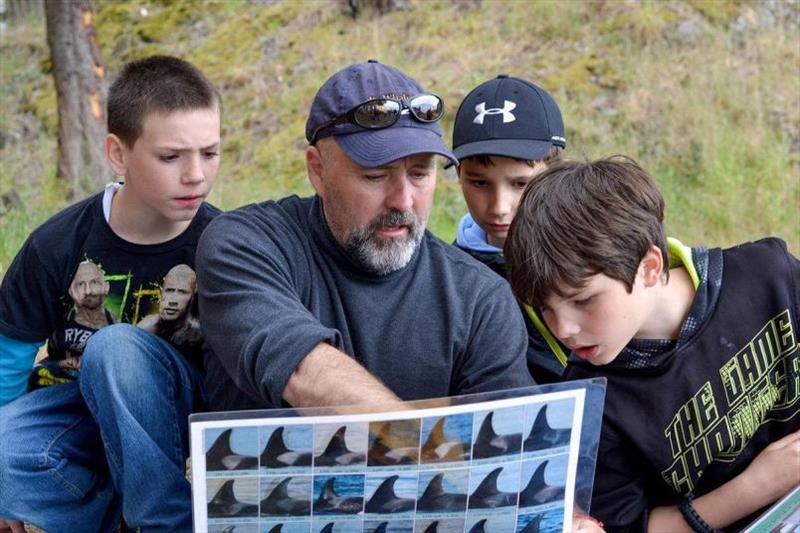
As "Killer Whale Tales" goes virtual, its reach extends around the world
by NOAA Fisheries 28 Feb 2021 18:46 UTC

Jeff Hogan of Killer Whale Tales shares details of Southern Resident and other types of killer whales with students prior to COVID restrictions © Killer Whale Tales
Cancellation of field trips, limited in-person classes, and other restrictions drastically changed what school looked like in 2020.
Every organization that works with kids had to accommodate new guidelines—including Jeff Hogan, founder and executive director of Killer Whale Tales. His organization uses storytelling to bring the wonder of Southern Resident killer whales directly to classrooms.
The challenges also created opportunities. As he has taken his program virtual, Jeff has extended his reach across the Southern Residents' entire range, and even around the world. "New schools have been popping up. Teachers need content that fits the new online environment and everyone is happy to have new subjects that break up the day," he says.
He founded Killer Whale Tales in 2000 after a trip to Washington's San Juan Islands rekindled his childhood appreciation and awe of killer whales. At that time he was a middle school teacher and photographer with a love of the natural world. He realized that these iconic and ecologically important animals were slipping away. So he took his love of Southern Resident killer whales and combined it with his professional talents, creating Killer Whale Tales.
Normally his program offers an hour-long story presentation to introduce the three Southern Resident pods to large groups of kids. Then he leads classrooms through hands-on exercises for one to two hours, depending on what the teachers are interested in. It's all free of charge if the students complete an at-home assignment called "Kids Making a Difference Now!" This activity challenges students to record their ecological footprints and apply sustainable strategies to reduce them.
Pandemic changes approach
Jeff's passion for Southern Residents hasn't subsided with the COVID-19 pandemic, but he has had to change his methods. He took the experience virtual. He is now running a thriving online program dedicated to educating kids about Southern Residents and what they can do to help the pods.
Most of his activities have stayed the same, but supplies are harder to come by. A large part of the program is to pass out data sheets and supplies for the activities. In a virtual environment, though, kids don't have access to the same resources. Jeff adapted by teaching kids how to make their own data sheets during class.
About 6,000 students have signed up as of winter 2021. Although he may not have hit his target numbers for 2020, he visited the same kids more often. That provided more depth to the experience, which he hopes will give them a stronger connection to the whales. His favorite part of the online interactions is the fantastic questions from kids, such as "What happens if the whales get cold?" and "How do they sleep?"
Reaching students everywhere the whales go
Before the pandemic, Jeff primarily reached audiences in the Puget Sound region of Washington State, where the whales are often most visible. The whales' habitat extends south as far as California's Monterey Bay, and they eat Chinook salmon from California's Central Valley. Now he can reach students there, too.
"Jeff's interactive program brings the whales into the classroom, even using an online platform. He inspires students to take actions to contribute to the health of Chinook salmon and, in turn, the endangered whales that need them to survive," said Lynne Barre, Recovery Coordinator for the Southern Residents at NOAA Fisheries' West Coast Region. "The results are amazing. By helping students track their actions, he can show them they have the power to help change the picture and recover these whales."
In 2017, NOAA Fisheries recognized Jeff with a Species in the Spotlight Hero Award for his work on behalf of the Southern Residents. We have supported Killer Whale Tales for more than a decade.
Since going online, Jeff has given more presentations to the general public, increasing his reach dramatically. He has spoken to students as far away as London and New Delhi, India. He is treating this new platform as a virtual "buffet." He scales classes and activities for any grade and also works with adult groups. The program structure still includes a story or lecture, experimental or role-playing activity, and take-home challenge. Jeff changes up the content to suit any audience.
Killer Whale Tales combines Jeff's love of teaching with his love of science and research. He figures that not all scientists are expert communicators, and teachers know how to best reach kids. Jeff is both, and has helped NOAA Fisheries scientists affix tracking tags to whales using long poles and suction cups. He also scoops orca poop samples from the water for scientific analysis.
The research gives scientists valuable information about their habitat and behavior. The trips also give Jeff a unique connection to the research and management of the whales. Looking forward, his vision is to embed teachers in research roles so they can learn the scientific process first-hand and give it a greater voice.
Jeff is excited that the new world of online learning gives him new and extended reach to teach students about the whales that he loves. If Jeff can adapt his lessons, the rest of us can adapt our actions, too. We can help preserve these whales, their habitat, and the Chinook salmon everyone—including the whales—loves to eat.